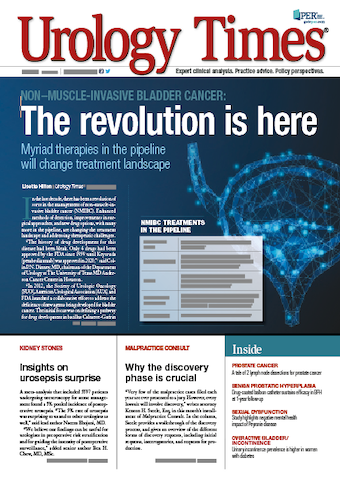Urology malpractice consult: Discovery phase could hold key to case
Any aha! moments usually come before trial begins.
Kenton H. Steele, Esq

Most of us are familiar with the trope of a fictional legal drama in which a key witness or piece of evidence is revealed for the first time at the critical moment of a trial. However, a “Perry Mason moment” rarely occurs in real legal disputes. The reason is simple. In most lawsuits, including cases involving alleged medical malpractice, the parties must exchange all information they will use as evidence well before the trial begins, a process known as discovery. This column provides an overview of the discovery process, the different types of discovery, and why the process is important.
What is the discovery process?
During discovery, each party can request information and documents from the other parties. This process prevents “trial by ambush,” where one side does not learn what information will be presented against them until it is too late to gather evidence to rebut the accusation. Discovery is necessary for achieving fair outcomes in legal disputes.
Although there are some limits on what information can be requested, the standard for whether a discovery request is permissible is broad. Generally, a discovery request is proper when it is “reasonably calculated to lead to the discovery of admissible evidence.” In other words, parties can ask for information that cannot be used as evidence if the party can show the request might lead to uncovering admissible facts.
What are the different types of discovery?
The exchange of information in a lawsuit consists of different forms of discovery requests, including:
Initial disclosures. Some jurisdictions have enacted rules requiring parties to voluntarily produce basic information to opposing parties even before that information is requested. Typically, a party must reveal the identity of witnesses with relevant information, documents supporting a party’s claims, and any insurance policy that may cover the cost if the plaintiff is awarded damages.
Interrogatories. These are open-ended questions sent to the other parties. In a case involving allegations of medical malpractice, a plaintiff may ask the defendant to provide the names of all staff members who provided care, information about the defendant’s education and work experience, and other information concerning the defendant physician’s practice. On the other side of the case, a defendant will typically request information about any medical conditions that predate the care at issue, prior lawsuits filed by the plaintiff, and details of the injuries the plaintiff claims the defendant caused.
Request for production. These requests are used to obtain relevant documents or physical evidence. In a medical malpractice lawsuit, the plaintiff will request all medical records related to the care at issue. Although producing a medical record may seem simple, things are rarely as easy as providing a printed copy of a patient’s chart. Plaintiffs often request the original files from the electronic record platform. These electronic files will show when information was added to the patient’s record and whether entries have been altered. A defendant can request records from care providers who treated the plaintiff before and after the care at issue. Through these records, a defendant can gain a complete picture of a plaintiff’s medical history and the course of a plaintiff’s recovery after an injury allegedly caused by the defendant’s negligence.
Requests for admissions. These requests consist of carefully worded factual contentions that parties must either “admit” or “deny.” This type of request can narrow the scope of a dispute. For instance, a plaintiff may ask a defendant to admit that an injury occurred. If the defendant admits the truth of the request, the parties focus on whether the injury was caused by the defendant’s actions.
Depositions. In a deposition, a witness provides sworn responses to questioning by counsel for one of the parties. Depositions are used to obtain all relevant information a witness may have. Depositions allow a party to learn everything a witness will say if they testify at trial. Moreover, if a witness’s testimony at trial is different than their deposition, the witness’s credibility can be attacked. The question will become, “Is the witness lying now or were they lying in their deposition?”
Unlike other forms of discovery where the attorney representing a party can help craft a response, depositions involve directly questioning an opposing party. Before a defendant physician is deposed, they will typically meet with the lawyer defending the case to prepare for all questions opposing counsel is likely to ask.
Conclusions
Very few of the malpractice cases filed each year are ever presented to a jury. However, every lawsuit will involve discovery. The information obtained and admissions made during discovery are often the deciding factors in resolving a case. As such, an understanding of the purpose and mechanisms in the discovery process is critical for any urologist involved in a legal dispute.

Malpractice Consult: What to know about direct examination of expert witnesses
December 4th 2023"In the 21st century, expert witnesses serve a vital role in presenting evidence to a jury. A good expert will be able to distill complex information into digestible elements the jurors can understand," writes Austin Richards, Esq.
Urology Malpractice: Kenton H. Steele, Esq, discusses expert witnesses from the attorney perspective
August 25th 2021“Their opinions do need to be credible and be honest, but there is some component of being able to walk a line between providing a candid, unbiased opinion, and knowing that you are retained to represent a specific side in that case,” says Kenton H. Steele, Esq.
Researchers evaluate data on priapism malpractice litigation
July 30th 2021“I think it's the responsibility of the physician to really take on educating and counseling and setting clear expectations and that way, when complications do arise, patients are better equipped, and they have a more favorable outcome,” says Ariana Matz, MD.
